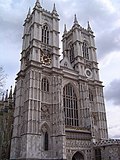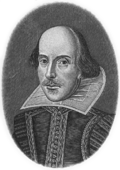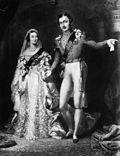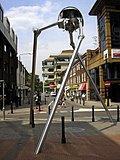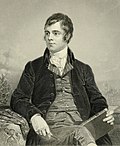Portal:United Kingdom
The United Kingdom Portal
 |
 |
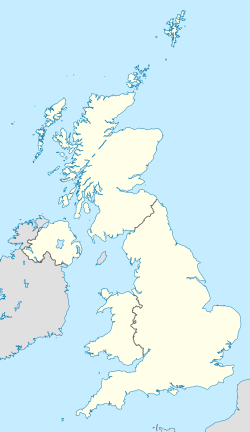
| |
The United Kingdom of Great Britain and Northern Ireland, commonly known as the United Kingdom (UK) or Britain, is a country in Northwestern Europe, off the coast of the continental mainland. It comprises England, Scotland, Wales and Northern Ireland. The UK includes the island of Great Britain, the north-eastern part of the island of Ireland, and most of the smaller islands within the British Isles, covering 94,354 square miles (244,376 km2). Northern Ireland shares a land border with the Republic of Ireland; otherwise, the UK is surrounded by the Atlantic Ocean, the North Sea, the English Channel, the Celtic Sea and the Irish Sea. It maintains sovereignty over the British Overseas Territories, which are located across various oceans and seas globally. The UK had an estimated population of over 68.2 million people in 2023. The capital and largest city of both England and the UK is London. The cities of Edinburgh, Cardiff and Belfast are the national capitals of Scotland, Wales and Northern Ireland respectively.
The UK has been inhabited continuously since the Neolithic. In AD 43 the Roman conquest of Britain began; the Roman departure was followed by Anglo-Saxon settlement. In 1066 the Normans conquered England. With the end of the Wars of the Roses the Kingdom of England stabilised and began to grow in power, resulting by the 16th century in the annexation of Wales and the establishment of the British Empire. Over the course of the 17th century the role of the British monarchy was reduced, particularly as a result of the English Civil War. In 1707 the Kingdom of England and the Kingdom of Scotland united under the Treaty of Union to create the Kingdom of Great Britain. In the Georgian era the office of prime minister became established. The Acts of Union 1800 incorporated the Kingdom of Ireland to create the United Kingdom of Great Britain and Ireland in 1801. Most of Ireland seceded from the UK in 1922 as the Irish Free State, and the Royal and Parliamentary Titles Act 1927 created the present United Kingdom.
The UK became the first industrialised country and was the world's foremost power for the majority of the 19th and early 20th centuries, particularly during the Pax Britannica between 1815 and 1914. The British Empire was the leading economic power for most of the 19th century, a position supported by its agricultural prosperity, its role as a dominant trading nation, a massive industrial capacity, significant technological achievements, and the rise of 19th-century London as the world's principal financial centre. At its height in the 1920s the empire encompassed almost a quarter of the world's landmass and population, and was the largest empire in history. However, its involvement in the First World War and the Second World War damaged Britain's economic power, and a global wave of decolonisation led to the independence of most British colonies. (Full article...)
Featured article
The Temple at Thatch is an unpublished novel by the British author Evelyn Waugh, his first adult attempt at full-length fiction. He began writing it in 1924 at the end of his final year as an undergraduate at Hertford College, Oxford, and continued to work on it intermittently in the following 12 months. After his friend Harold Acton commented unfavourably on the novel in June 1925, Waugh burned the manuscript. In a fit of despondency from this and other personal disappointments, he then made a half-hearted suicide bid before returning to his senses. In the absence of a manuscript or printed text, the only information as to the novel's subject comes from Waugh's diary entries and later reminiscences. The story was evidently semi-autobiographical, based around Waugh's Oxford experiences. The protagonist was an undergraduate and the work's main themes were madness and black magic. Some of the novel's ideas were incorporated into Waugh's first commercially published work of fiction, the 1925 short story "The Balance", which includes several references to a country house called "Thatch" and, like the novel, is partly structured as a film script. Acton's severe judgement did not deter Waugh from his intention to be a writer, but it affected his belief that he could succeed as a novelist. For a time he turned his attention away from fiction, but with the gradual recovery of his self-confidence he was able to complete his first novel, Decline and Fall, which was published with great success in 1928. (Full article...)
Featured biography
Paulinus of York was a Roman missionary and the first Bishop of York. A member of the Gregorian mission sent by Pope Gregory I to convert the Anglo-Saxons to Christianity in 601, Paulinus arrived in England by 604 with the second missionary group. Little is known of Paulinus' activities in the following two decades. After some years spent in Kent, Paulinus was consecrated a bishop, probably in 627. He accompanied Æthelburg of Kent, sister of King Eadbald of Kent, on her journey to Northumbria to marry King Edwin of Northumbria, and eventually succeeded in converting Edwin to Christianity. Paulinus also converted many of Edwin's subjects and built a few churches. One of the women Paulinus baptised was a future saint, Hilda of Whitby. Following Edwin's death in 633 Paulinus and Æthelburg fled Northumbria, leaving behind a member of Paulinus' clergy, James the Deacon. Paulinus returned to Kent, where he became Bishop of Rochester. After his death in 644, Paulinus was venerated as a saint. (Full article...)
General images -
Subportals
WikiProjects
Things you can do
- Visit the British Wikipedians' notice board.
- The noticeboard is the central forum for information and discussion on editing related to the United Kingdom.
- Comment at the British deletion sorting page.
- This page lists deletion discussions on topics relating to the United Kingdom.
Featured pictures
Did you know -

- ... that Elizabeth II's childhood toys at 145 Piccadilly included 30 toy horses and a farm set collected from Woolworths?
- ... that when Sarah Jane Baker was released after 30 years, she was the United Kingdom's longest serving transgender prisoner?
- ... that by losing her constituency of South West Norfolk in 2024, Liz Truss became the first former UK prime minister since 1935 to lose their seat?
- ... that Ruth Northway is the United Kingdom's first professor of learning disability nursing?
- ... that "one of the finest cut brick façades" in the United Kingdom has been partially obscured by scaffolding for four years, as funds are raised for its repair?
- ... that Liz Shore's nomination to be Chief Medical Officer of the United Kingdom was vetoed by Margaret Thatcher because of Shore's husband's political affiliation?
In the news
- 29 July 2025 – 2025 New York Peace Conference on Gaza, International recognition of Palestine
- United Kingdom prime minister Keir Starmer declares that the UK will formally recognize the State of Palestine should a ceasefire not be achieved by September. (The Telegraph)
- 28 July 2025 –
- Two people are killed and two others are injured, including the perpetrator, in a mass stabbing on business premises on Long Lane in Southwark, London, United Kingdom. (Sky News)
- 25 July 2025 – Online Safety Act 2023
- Thousands of websites begin implementing age verification to block "adult content" for British viewers under the age of 18, according to Ofcom. (BBC News)
- 24 July 2025 – Hungary–Israel relations, Hungary–United Kingdom relations
- Hungary bans Irish rap trio Kneecap for three years ahead of a music festival, citing a national security threat over their alleged support for Hamas and Hezbollah. (The Times of Israel)
- 19 July 2025 –
- In boxing, Ukrainian Oleksandr Usyk defeats British challenger Daniel Dubois at Wembley Stadium in London, England, via a fifth-round knockout to become a two-time undisputed heavyweight champion. (BBC Sport)
- 17 July 2025 –
- The British government announces it will lower the voting age to 16, allowing 16- and 17-year-olds to vote in the upcoming general election. (NPR)
Categories
Other UK-connected Wikipedias
Wikimedia
The following Wikimedia Foundation sister projects provide more on this subject:
-
Commons
Free media repository -
Wikibooks
Free textbooks and manuals -
Wikidata
Free knowledge base -
Wikinews
Free-content news -
Wikiquote
Collection of quotations -
Wikisource
Free-content library -
Wikiversity
Free learning tools -
Wikivoyage
Free travel guide -
Wiktionary
Dictionary and thesaurus

















